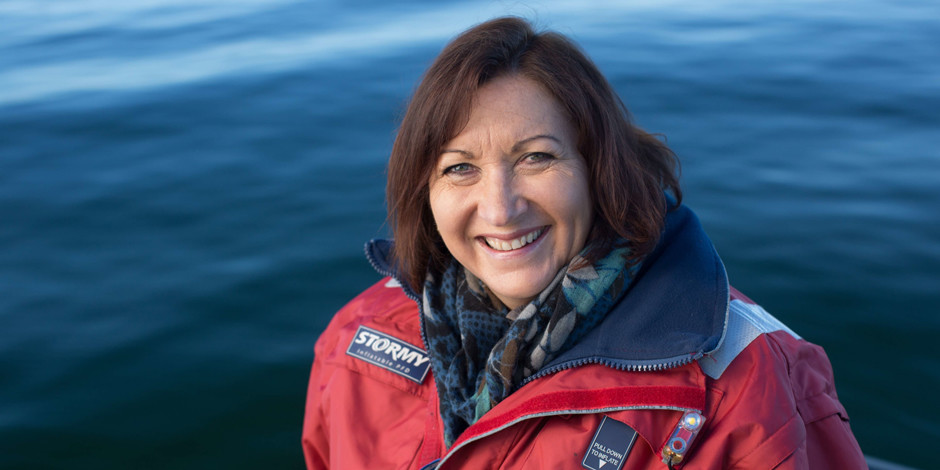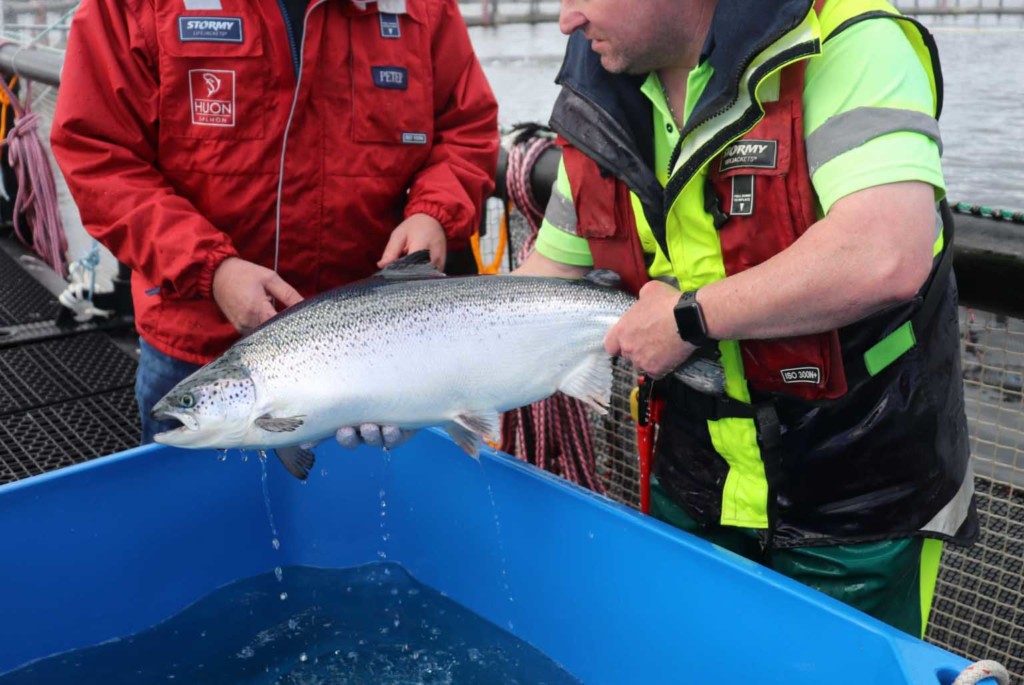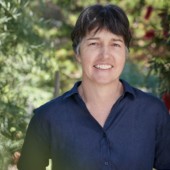Tasmanian salmon farmer raises the bar on sustainability
Huon Aquaculture has grown from a sideline business to an internationally-recognised supplier of farmed salmon, but for executive director Frances Bender, it’s the quiet things that really matter.

Being executive director of a multi-million dollar company is not where Frances Bender expected to land when she married a farmer she met at a railway station, but that’s the trajectory her life took.
Frances and Peter Bender co-found and run Huon Aquaculture, which is now the second-largest aquaculture company in Australia, based out of Dover’s picturesque Hideaway Bay in Tasmania.
Huon Aquaculture farms salmon and ocean trout, selling fish across Australia and internationally, and employing over 700 people. All this, from what began as a sideline business to the Bender family farm where beef and sheep were raised.
“We are still farmers,” Frances said. “We are not fishermen.
“Any farmer knows they are the custodian of their stock and custodian of their land. For us, that’s fish and water.
“Unless you are really looking after those things, you don’t have a sustainable business.”
Frances said she and Peter, who is Huon’s CEO, run the business as a fully vertically-integrated company, managing every single step in the process including harvest, processing, packing and dispatch.
Strong sustainability credentials key to farming success
Frances attributes the company’s strong sustainability and animal welfare credentials to a deeply held philosophy of continuous improvement. In 2018, Huon Aquaculture became the first Australian salmon producer to join the RSPCA Approved Farming Scheme.
“I believe we were the first agri-industry company in the world to develop a sustainability dashboard, which is publicly available on our website to transparently report what we are doing in real-time,” Frances said.
“Yes, we have the ticks for animal welfare, sustainability and climate change, but we didn’t do any of the things we do just to get those ticks. It’s just the way we do things.”
But Frances conceded that in a social-media-driven world where detractors have an unguarded platform, the accreditations are important to help show customers and the public that the company is doing the right thing.
Investing in ‘low carbon’ seafood production
Huon invests millions of dollars in research each year and is at the forefront internationally in feed research, fish containment systems and environmental considerations.

Frances said salmon farming is one of the most efficient ways of using natural resources to produce a healthy protein. “It has a low carbon footprint, high energy and protein retention efficiency and low water footprint,” she said.
RELATED: Impact investing for the future of food
“Feed is about 50% of our cost of production. From a business perspective, the number one reason we don’t want to waste it is because we don’t want to negatively impact the sea-bed. Secondly, if we waste fish feed, we waste money.”
“The learning curve for our business is still vertical and has been since we started 35 years ago,” Frances said.
Building climate resilience is a key goal for the business in safeguarding sustainable production. Amoebic gill disease, is one particular risk that affects salmon, and is exacerbated by warming waters. Breeding salmon resistant to the amoeba has helped make Huon more adaptable to the warming oceans associated with climate change.
Choosing to move further off-shore to rougher seas in 2014 (a hefty investment), provided more water movement and greater dissolved oxygen levels and water temperatures for the fish. This required the development of fortress pens – a world first – that keep staff, stock and wildlife safe, culminating over three decades of farming knowledge.
The double netted pens, made with material much like that used for bulletproof vests keep seals out and fish in, so they’re flexible to ride the swell and withstand the punishing offshore weather.
Why building people up is so important for Australia’s rural industries
Frances believes continuously learning and improving, along with a willingness to recruit and support talented people, is where she sees the company’s strength coming from. She laughed when she said she’s now one of the least qualified people in the meetings she attends.
“One of the things I like the most (about the business) is a thing that is never seen on a balance sheet,” Frances said. “I really enjoy being part of a meeting and working with a team, seeing the next generation and their skill and passion coming through.
“I love seeing young people, especially the vocationally trained young men, some of them coming from low socioeconomic backgrounds, getting to a point where they settle down and buy a house and have a family. I find that really fulfilling.”
And to the young women coming through, Frances’s message is to go for it.
“I’ve always encouraged it, but because we have been a rapid adopter of technology, there are more and more opportunities for women now,” she said. “In the early days, the jobs were very physical and there’s no getting away from that. Now there’s no job a woman couldn’t do.”
RELATED: Young kiwifruit farmer seeks to remedy rural labour challenges
Had it not been for the COVID-19 pandemic, 2020 might have seen Frances and Peter step back from the business a little, but so far that hasn’t happened.
“I don’t think we’ll ever be able to completely distance ourselves,” Frances said. “It’s not just that we have grown a business, we have grown an industry that didn’t exist before.”
Enjoyed this story? Want to learn more about the Asia Pacific region’s innovative agrifood tech ecosystem? Sign up for our newsletter here and receive fresh stories about global leaders, farmers, startups and innovators driving collaborative change.
